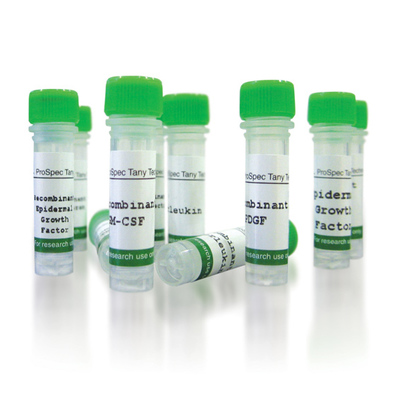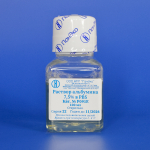Tumor Necrosis Factor-alpha Human Recombinant
TNF-alpha, Tumor necrosis factor ligand superfamily member 2, TNF-a, Cachectin, DIF, TNFA, TNFSF2.
TNF-a is cytokine involved in systemic inflammation and falls under cytokines group, stimulating reaction acute phase. TNF is secreted mainly by macrophages.
TNF is the cause of apoptotic cell death, cell proliferation, differentiation, inflammation, tumor formation and viral replication. This factor is also involved in fat metabolism and coagulation. The main TNF function is to stimulate immune cells.
Violations of regulation and TNF hyperproduction play an important role in development of various human diseases, for example, autoimmune diseases, insulin resistance, cancer development.
Human recombinant TNF-a is produced by E. coli as single-stranded non-glycosylated polypeitide consisting of 158 amino acid residues (157 amino acids of mature human TNF-a and methionine from N-terminus).
Molecular weight is 17.5 kDa.
This product is intended for research purposes.
The preparation was derived from HEK cells, sterile filtered, lyophilized and purified chromatographically. It consists of 157 amino acid residues.
Lyophilized from solution, concentration of 1 mg / ml in 1xPBS.
Recommendations for dilution and storage:
The preparation should be diluted in sterile water, at concentration of at least 100 micrograms/ml. After that further dilution and separation to desired aliquots is possible.
Despite the fact that lyophilized TNF-a can be stable at room temperature for 3 weeks, store the dry preparation at -18oC. TNF-a solution is stored in the refrigerator for 2-8oC for 7 days, for longer storage - in the freezer at-18oC. For long-term storage add carrier protein (0.1 HSA or BSA). Repeated freezing and thawing is not allowed.
Purity.
The purity was determined by electrophoresis in polyacrylamide gel (SDS-PAGE) and is 95.0%.
















